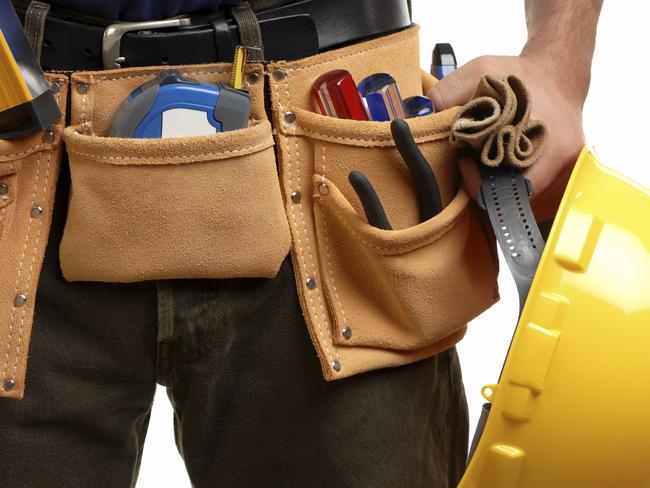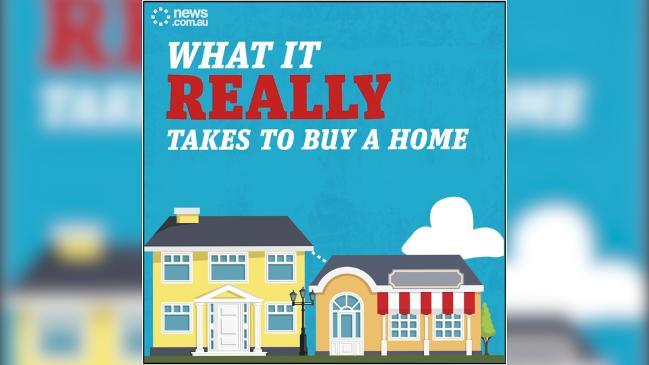Barefoot Investor: Tradie needs to stop surviving via Centrelink and get out of debt
THE universe is telling a self-employed tradie, caught in a debt trap, to start looking for a regular job, writes Barefoot Investor.

Barefoot Investor
Don't miss out on the headlines from Barefoot Investor. Followed categories will be added to My News.
THE universe is telling a self-employed tradie, caught in a debt trap, to start looking for a regular job, writes Barefoot Investor.
DEB WRITES: I have a bone to pick with you. I have been a loyal follower for years, have all the newsletters, and have just bought your book. I have read it and re-read it and now am more confused and frustrated than ever! I am a stay-at-home mum. My husband is a self-employed tradie who relies heavily on a $9500 business overdraft. He earns between $45,000 and $55,000 after tax to ensure we can still get Centrelink ($10,000). His income is so sporadic that, when it does finally come in, it is gone on living expenses, suppliers and a bit of savings. Your steps can’t work for us.
BAREFOOT REPLIES: Are you seriously happy living your life playing Centrelink limbo? The problem with that game is that, even if you manage to earn as little as you can to get under the bar, you’re still … in limbo. If your husband is earning only $45k a year as a tradie running his own show (with debt!), that’s the universe telling him it’s time to seek out a regular job and then focus on paying off his overdraft. And another thing: a good tradie doesn’t blame his tools ... my steps work, but they need the right materials: in your case, cash!

TIME TO DIVERSIFY
BERNICE ASKS: We got Commonwealth Bank shares when the bank was floated years ago. Until recently they were worth $100,000, but now they have plunged to just $74,000. We are retired and self-funded (income about $70,000 combined) and do not want to watch them disappear! What is your recommendation?
BAREFOOT REPLIES: I’ll answer your question in a moment but first, for the benefit of younger readers, let me give the backstory: The Commonwealth Bank floated on the share market in 1991, for $5.40 a share. The minimum you could purchase in the float was 400 shares — so you BPAY’d your $2160. A few weeks later you ticked the “dividend reinvestment plan” form. And then you sat back and ate kabana.
Fast forward to today. Your $2160 investment is now worth … drum roll please ... $138,400. (So, given you say your shares have “plunged to $74,000”, I’m assuming you have sold some along the way.) Let me give you one more amazing stat: last year CBA paid out $4.29 per share in dividends … that’s 80 per cent of what you initially paid for each share! So that’s the backstory.
Now let me answer your actual question — should you sell your CBA shares? The answer is … it depends. If your CBA shares make up more than 30 per cent of your portfolio, it would be wise to sell down part of your holding and diversify by investing in other companies. (This doesn’t just apply to CBA shares; it’s not good to be too reliant on any one company.) It’s even more attractive if you’re holding the shares in a self-managed super fund and you’re in pension phase, as there are no tax consequences. Either way check with your accountant. Winner, winner, chicken dinner!

RATE DEBATE VARIES
MATT ASKS: My wife and I are having a disagreement about fixed v variable home loan rates. I have your book and I notice that Rule 2 is “Don’t Fix Your Rate”. Well, my wife just threw your book against the wall! Currently we have a variable rate loan (discounted from the standard variable rate), but let’s say we fixed our rate for three years. After that time, would we be transferred back to the discounted standard variable rate or would there be some issue?
BAREFOOT REPLIES: She threw my book against the wall? Spicy! Most banks will flick you back to their standard variable rate after your fixed term ends. There’s nothing stopping you from fixing again, of course, but it will be at the rate on offer at that time. Personally, unless you’re eating sausages each night (things are really tight), I don’t like fixed rate loans, for the same reason that mortgage brokers and bankers love them — they lock you in! Listen: get the cheapest variable rate you can, and repay as much as you can, and you’ll come out ahead. Bottom line: I like the flexibility. Right now I’m seeing sharp variable rates: like UBank is at 3.74 per cent. P.S. I’m ducking!

SET THE DATE
JAKE ASKS: I have read your book and love it. Using your formula I have already paid off a long-term debt. Unfortunately, my partner and I have separate finances (her choice) and I recently found out that, in the time I paid off my debt, she racked up another for twice as much. Frustrating! We both earn OK incomes (combined $200,000), but are still renting at age 37. As we have three kids, I really want to get into our own home in the next four years … how do I convince her?
BAREFOOT REPLIES: Uh-oh. So you two have made the ultimate commitment — three puppies — and yet she’s still keeping you in the kennel when it comes to sharing her bank account with you? As Dr. Phil would say: “Hmmm”. And now you want me to tell you how to convince her? Honestly?
I only have one party trick. I wrote about it in my book. It’s called a monthly Barefoot Date Night. And I can tell you that, more than 410,000 copies later, it works unbelievably well. Not only will it get you on the same (financial) serviette, but you two will be stronger and happier when you’re working towards a shared financial goal — especially when it’s something as amazing as buying your own family castle. That’s how I’d sell it to her anyway (and then I’d bribe her with great food and wine). And if that doesn’t work?
Well, maybe it’s time to stop talking and start watching: after all, money talks and bulldust walks. I’ve learned that if you want to know what someone values, look at what they’re spending their dough on. So the question is, Jake, what’s your partner spending her dough on?

HANDLING THE HATERS
THE other day I was doing an interview with Mia Freedman, the founder of Mamamia. I told her that if I printed out all the hate mail I got, I could bail it. Mia: “Are you seriously suggesting you have people who hate you … you, the Barefoot Investor?” Me: “Absolutely.” Sure, I’ve got the best-selling book in the country this year — but it hasn’t been all bookmarks and semicolons. Take this online review of my book: “All in all, if I had to describe the book in one sentence it would be ‘The more I read, the dumber I felt’ — not because Scott made it so simple, but because it was apparently clear he really has no idea.” Ka-pow!
That is a superb sledge that even the great Rodney Marsh (ask your father) would be proud of. That and many other awful things are live on the interwebs for all eternity. My customers could read it. My nanna could read it (well, probably not). My kids could (eventually) read it. How would that make you feel? Not great, is my guess. Yet the only way to avoid criticism, as the old saying goes, is to say nothing and do nothing. But where’s the fun in that? So, let me tell you a simple trick I use to deal with haters.
CARE WITH BOTH HANDS
Truth is, most people worry about what other people say about them. Yet here’s the rub: if you’re doing brave things — working hard, starting a business, kicking arse with the Barefoot Steps — chances are you’re going to make someone around you feel uncomfortable. And they may try to bring you down a peg or two — back to their level. If you listen to them, or worry about what you think they’d think, it’ll eat away at your self-confidence. And that will keep you in jobs you don’t like, relationships you’ve outgrown and cars you can’t afford. Worse, it’ll waste the precious time you have on this planet.
What’s the answer? Care with both hands. I can count the number of people I care about on two hands and chances are you can too. And when you think about it deeply (and I have), these are the only people who matter. If you’re being a jerk, or hurting people, or behaving like a Kardashian, they’ll pull you up on it. And that’s the only time you need to worry about someone’s else’s opinion. For the rest, just talk to the hand.
Tread Your Own Path!
READ MORE BAREFOOT:
Barefoot Investor weighs in on booming Bitcoin
What to do when your partner spends too much
Teach your teen money management
The Barefoot Investor holds an Australian Financial Services Licence (302081). This is general advice only. It should not replace individual, independent, personal financial advice
Originally published as Barefoot Investor: Tradie needs to stop surviving via Centrelink and get out of debt


